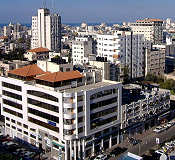 You can rest assured that this will probably be the first, last and only Export Law Blog post with a link to a story in a Norwegian Marxist-Leninist-Maoist newspaper called, in English, “The Class Struggle” ( or “Klassekampen” in Norwegian). And it’s not just because we find the concept of a Norwegian Marxist-Leninist-Maoist to be sort of comic, at least in the same sense of say, a Belarusan Scientologist or a North Korean Tory. There is, trust me, a legitimate didactic purpose here.
You can rest assured that this will probably be the first, last and only Export Law Blog post with a link to a story in a Norwegian Marxist-Leninist-Maoist newspaper called, in English, “The Class Struggle” ( or “Klassekampen” in Norwegian). And it’s not just because we find the concept of a Norwegian Marxist-Leninist-Maoist to be sort of comic, at least in the same sense of say, a Belarusan Scientologist or a North Korean Tory. There is, trust me, a legitimate didactic purpose here.
The article in question (translated here) argues that sanctions enforced by the Office of Foreign Assets Control (“OFAC”) are prohibiting the reconstruction of schools and hospitals destroyed in the January air attacks by Israel on buildings in the Gaza Strip. It’s not at all clear how OFAC sanctions are affecting aid from non-U.S. NGOs. But the article is correct that Hamas’s status as a Specially Designated National (“SDN”) and its control of the government of the Gaza Strip broadly prohibits most transactions, humanitarian or otherwise, by U.S. persons with the Gaza Strip government.
When Hamas gained control of the Palestinian Authority after the January 2006 elections, its status as an SDN led to what I call “constructive sanctions” against the Palestinian Authority — “constructive” in the sense that the Palestinian Authority was not itself listed by OFAC as a sanctioned regime. Thereafter, OFAC issued six general licenses permitting certain humanitarian activities in areas controlled by the Palestinian Authority, provided there were no direct dealings with Hamas. After the takeover of Gaza by Hamas in 2007, the PA, then only in control of the West Bank, formed a new government without Hamas participation, and OFAC permitted all transactions with the West Bank, exclusive of any transactions with any remaining elements of Hamas in the West Bank.
My concern here is with constructive sanctions that require exporters not only to consult OFAC’s lists but also to be aware of complex geopolitical considerations in countries to which they export. Just as an exporter may not know that the CNDD-FDD controls Burundi, it may not know that Hamas controls Gaza. OFAC, of course, knows who’s running Gaza and ought to simply sanction Gaza directly rather than do so indirectly through its sanctions on the controlling political party. It is reasonable to expect exporters to consult a list of sanctioned governments, but not to research the controlling party of a country and then to see whether that party is an SDN or not.
 Permalink
Permalink
Copyright © 2009 Clif Burns. All Rights Reserved.
(No republication, syndication or use permitted without my consent.)

 Posted by
Posted by  Category:
Category: 

